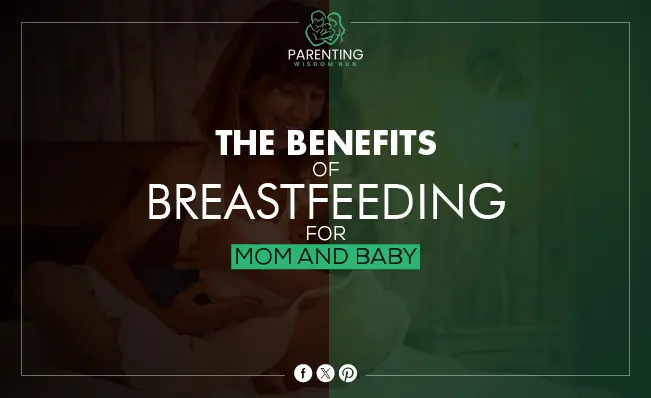Introduction
Breastfeeding transcends its purpose as a mere nutrition method; it signifies a deep and exquisite bond between a maternal figure and her infant. This organic process produces vital sustenance and cultivates an extraordinary connection that endures throughout one’s existence. This blog will explore the realm of lactation, revealing the remarkable advantages it provides for both nursing mothers and their infants.
Are you a mother? And you are worried about your child’s health? Why are you facing breastfeeding problems? Read Blog: How to Deal with Common Breastfeeding Problems
Don’t worry, we have got a lot of information for you.
Considering the physiological benefits it confers on well-being and the emotional bond it establishes, lactation is an extraordinary endeavor that merits investigation. Let us begin this heartening exploration of the advantages of lactation for both the mother and the infant.
The Importance of Breastfeeding
1. For the Baby
Breastfeeding is an essential foundation in the early years of a child’s existence, providing an array of advantages that transcend basic nourishment. Discuss the critical reasons breastfeeding is essential for the health and development of the infant.
Optimal Nutrition
Lactation is the ideal nourishment provided by nature for infants. It is abundant in vital nutrients, vitamins, and minerals that furnish the infant with all necessary for optimal development and progress throughout the pivotal initial months of existence. It provides the optimal proportions of carbohydrates, lipids, and proteins for the infant’s dietary needs.
Easy Digestion
An infant’s digestive system is fragile and in the process of developing. Breast milk’s ideal composition facilitates digestion, decreasing the likelihood of experiencing digestive issues and discomfort. This ensures the infant’s immature digestive tract is well-rested while absorbing nutrients.
Immune System Support
An exceptional characteristic of breast milk is its capacity to strengthen the infant’s immune system. White blood cells and antibodies are abundant, protecting against infections and disorders. This long-lasting health benefit aids the infant in warding off common ailments, including ear infections and colds.
Tailored Nutrition
The composition of breast milk is dynamic. It adjusts to the developing requirements of the infant. The breast milk of a neonate, for example, differs significantly from that of a six-month-old. Personalized nutrition guarantees that the infant consistently receives an optimal ratio of nutrients commensurate with their developmental stage.

Bonding and Comfort
In addition to contributing to the child’s nutrition, breastfeeding is a lovely method for the mother and child to develop a closer relationship. Intimate physical proximity and direct contact with the epidermis engender a profound emotional bond. Breastfeeding engenders feelings of security and affection in the infant by providing solace and affirmation.
Cognitive Development
According to research, breastfed infants may experience more advanced cognitive development. DHA (docosahexaenoic acid), one of the unique nutrients found in breast milk, is crucial for brain development and may contribute to higher IQ scores over time.
2. For the Mother
There are numerous advantages to breastfeeding for both the mother and the infant. Let us examine the substantial benefits it imparts to the health and overall welfare of the mother.
Postpartum Recovery
The mother must breastfeed during her postpartum recovery. It facilitates the postpartum contraction of the uterus, thereby accelerating its restoration to its pre-child weight state. Practicing this can effectively mitigate postpartum hemorrhage and expedite the recuperation process.
Weight Loss
Mothers may naturally and effectively lose the excess weight they gathered during pregnancy through breastfeeding. The additional calories required to produce milk may aid in weight loss. In addition, it has the potential to enhance body composition through the reduction of adipose tissue.
Reduced Risk of Certain Cancers
Breastfeeding is associated with a decreased incidence of breast and ovarian cancer in mothers, according to studies. The duration of breastfeeding by a woman contributes to the intensification of this protective effect. Long-term health benefits are associated with the reduced risk of developing these malignancies promoted by breastfeeding.
Emotional Bonding
A profound emotional bond is formed between a mother and her infant through breastfeeding. Strengthening the attachment through skin-to-skin contact and physical proximity during breastfeeding may have favorable implications for the mother’s emotional well-being. It provides an intimate and one-of-a-kind opportunity for the mother to bond with her infant.

Stress Reduction
The act of breastfeeding induces the secretion of oxytocin, which is commonly called the “love hormone.” In addition to aiding in the expulsion of milk, this hormone also induces a state of relaxation and mitigates tension. Mothers may experience a tranquil effect that reduces their anxiety and increases their sense of comfort.
Enhanced Postpartum Mental Health
For mothers, breastfeeding may contribute to improved mental health after childbirth. The establishment of an emotional connection via lactation has the potential to mitigate the likelihood of developing postpartum depression and anxiety. Providing solace and nurturing to an infant via breastfeeding can induce feelings of satisfaction and joy.
Bonding and Emotional Benefits
Beyond merely delivering sustenance, breastfeeding is an intense and personal endeavor that cultivates a robust emotional connection between the mother and her infant. An examination of the exceptional emotional advantages lactation imparts to this unique bond is warranted.
Skin-to-Skin Contact
During breastfeeding, the mother and child can have extensive skin-to-skin contact. Engaging in close physical proximity while nursing engenders a deep sensory encounter, enabling the infant to perceive the maternal body’s solace and warmth. This physical bond can provide solace and comfort to the mother and the infant.
Psychological Connection
In addition to being a biological process, breastfeeding is also a psychological one. It fosters a profound attachment and connection between the mother and the infant. By providing nourishment and nurturing, breastfeeding fosters a profound emotional connection. It facilitates the infant’s sense of safety, affection, and emotional attachment to their mother.
Mutual Soothing
Breastfeeding provides the infant with an inherent system of reassurance and solace. Nursing contributes to the provision of not only vital nourishment but also psychological solace. A fussy or distressed infant can frequently be calmed through breastfeeding, which makes it an effective method of meeting the emotional requirements of the infant.
Enhanced Maternal Confidence
Breastfeeding has the potential to enhance a mother’s self-assurance and maternal inclinations. By enabling her to provide nourishment and solace to her child, she solidifies her position as a caregiver, and this perception of achievement and proficiency may adversely affect her self-esteem.
Hormonal Bonding
The breastfeeding process induces the secretion of oxytocin, commonly known as the “love hormone.” Oxytocin facilitates emotional attachment and bonding by encouraging the mother to feel warm and affectionate towards her infant. This hormonal bonding can establish a durable emotional bond that transcends the phases of breastfeeding.
The Role of Breast Milk
Breast milk is frequently likened to the “liquid gold” bestowed by nature to sustain and safeguard neonates. Its significance is manifold and indispensable in advancing the well-being and growth of young individuals. In this discourse, we shall explore mother milk’s extraordinary and distinctive functions.
Unique Nutrients
Breast milk possesses an exceptional nutritional composition that is precisely designed to fulfill the nutritional requirements of the infant. It comprises an ideal balance of proteins, fats, carbohydrates, vitamins, and minerals, all essential for the baby’s optimal development and growth in the formative months.
Immunological Benefits
Antibodies, white blood cells, and immune-boosting substances abound in breast milk, forming a formidable defense system for the infant. These components include actively protecting the infant from infections and disorders. Breast milk gives the infant an inherent defense mechanism against common ailments, including respiratory problems, ear infections, and colds.
Growth Factors and Hormones
Growth hormones and growth factors found in breast milk are crucial to the infant’s overall development. By promoting tissue maturation and growth, these substances ensure that the infant’s body develops normally.
Digestive Enzymes
Digestive enzymes present in breast milk facilitate nutrient absorption and digestion. Enzymes facilitate the infant’s embryonic digestive system in its breast milk processing, thereby decreasing the likelihood of digestive complications.
Anti-Inflammatory Properties
The anti-inflammatory properties of breast milk reduce the infant’s risk of developing inflammatory conditions. Additionally, it protects against inflammatory disorders and comforts the digestive tract.
Prebiotics for Gut Health
Prebiotics found in breast milk provide nourishment for beneficial gut flora. There is a correlation between a balanced intestinal microbiome and improved digestion and overall health. These vital microorganisms are nourished by breast milk, thereby making a positive contribution to the infant’s digestive health.
Long-Term Advantages
The advantages of breastfeeding transcend the initial phases of infancy. The long-term benefits of breastfeeding impact the infant’s health, development, and well-being. Consider the long-lasting advantages that lactation provides for the infant and the mother.
Reduced Risk of Diseases
A reduced incidence of chronic diseases is associated with breastfeeding for mothers and infants. It can decrease in neonates the probability of developing chronic diseases such as obesity, type 2 diabetes, and asthma in the future. The fact that breastfed infants typically have a healthier beginning can positively affect their health throughout their lives.
Enhanced IQ and Cognitive Development
According to research, infants who are breastfed frequently demonstrate improved cognitive development. Essential for brain development and operation are the unique nutrients in breast milk, including DHA (docosahexaenoic acid). This may enhance cognitive abilities and IQ scores from infancy to adulthood.
Protection from Infections
Breastmilk contains antibodies and immune-boosting properties that aid in the development and strengthening of the infant’s immune system over time. As a result, breastfed children exhibit a diminished susceptibility to severe infections and a shorter duration of protection against a range of infections and diseases.
Reduced Risk of Allergies
In children, breastfeeding is associated with a reduced risk of developing allergies. Breast milk’s protective attributes may assist in reducing the infant’s vulnerability to allergies and subsequent allergic reactions in adulthood.
Lower Risk of Sudden Infant Death Syndrome (SIDS)
Breastfeeding has been associated with a decreased risk of Sudden Infant Death Syndrome, according to studies. Although the precise underlying mechanism remains unknown, breastfeeding seems to provide protective attributes against this lamentable occurrence.
Emotional Bonding and Security
Establishing an emotional bond via breastfeeding affords the infant enduring emotional security. Throughout a child’s lifespan, this sense of attachment and comfort may positively affect their emotional and psychological health.
The Challenges of Breastfeeding
Although lactation provides many advantages, it is critical to recognize that it may also pose difficulties for certain mothers. It is possible to experience these challenges as part of the breastfeeding journey. In this discussion, we shall examine prevalent obstacles that may arise during lactation and propose strategies for their effective management.
Initial Struggles
Early on, breastfeeding can be difficult to manage. Difficulties with suction, positioning, and milk supply are common among mothers. These difficulties may induce feelings of frustration and anxiety. But with the proper direction and assistance, most of these obstacles can be confronted and surmounted.
Balancing Work and Breastfeeding
Working while lactating can present a formidable obstacle. It can be challenging to organize milking schedules, store breast milk, and ensure a sufficient supply for the infant. Employers can offer support through designated pumping areas and adaptable work arrangements.
Engorgement
Engorgement, characterized by breast fullness and tenderness, may manifest during the initial stages of lactation. Latching may become more difficult and uncomfortable as a result. In addition to heated compresses and regular feeding, expressing breast milk and feeding can help alleviate engorgement.
Sore Nipples
Nipple soreness is a prevalent complaint among women who are lactating. Dry skin, an improper clasp, or improper positioning may cause this discomfort. Nipple soreness can be mitigated by implementing lanolin lotion, latch adjustment, and correct positioning.

Milk Supply Concerns
Certain mothers experience concerns regarding their milk supply, harboring apprehensions that they might fail to generate adequate milk for their infant. By nursing on demand, maintaining a healthy diet, and remaining hydrated, one can help ensure a sufficient milk supply. If necessary, lactation consultants can provide direction regarding the augmentation of milk production.
Growth Spurts
Babies experience growth spurts, making them appear ravenous and desire to nurse constantly. Although they are brief, the mother may find these times to be very draining. During these stages, it’s critical to attend to the baby’s requirements and ensure they have breast access.
Weaning
For some mothers, the decision of when and how to wean an infant from breastfeeding can be emotionally taxing. It is a subjective choice that differs among individual mothers. Weaning must be approached with sensitivity and consideration for the requirements of both the mother and the infant.
Tips for Successful Breastfeeding
Although breastfeeding is a gratifying and advantageous endeavor, it has its share of obstacles. You can successfully overcome these obstacles and ensure a rewarding and fruitful lactation experience with the proper information and assistance. Here are some helpful suggestions to assist you in lactating successfully:
Seek Support
Getting assistance is one of the most important things for breastfeeding to succeed. Speak with medical experts, lactation specialists, or support networks. They can help you navigate obstacles, respond to inquiries, and give insightful counsel.
Proper Nutrition
A lactating mother needs to consume a nutritious diet. A nourishing, well-balanced diet should be maintained, rich in fruits, vegetables, and whole cereals. Consume copious amounts of water to maintain hydration. Your nutritional intake directly affects the quality of your breast milk.
Managing Stress
Stress has an impact on milk production. Discover techniques to de-stress and unwind. Take pauses, sleep properly, and engage in relaxing activities like meditation or deep breathing. Breastfeeding is more comfortable for a woman who is at ease and content.
Conclusion
In summary, lactation constitutes an essential and profound component of a mother’s process of providing nourishment and care for her infant. It confers exceptional nutritional advantages, fosters deeper emotional connections, and establishes a solid groundwork for an optimal quality of life. The long-lasting benefits endure throughout the child’s lifetime. Although there may be obstacles to overcome, achieving a successful and gratifying lactation experience is possible by implementing appropriate strategies and pursuing support. Ultimately, breastfeeding transcends mere nourishment and signifies an enduring homage to the unique bond between a mother and her infant.
FAQs
Q1. How long should I breastfeed my baby?
Following the initial six months of exclusive breastfeeding, the American Academy of Pediatrics advises that the infant be weaned off to complementary diets for a minimum of one year. Numerous mothers elect to continue breastfeeding for at least two years.
Q2. Can I breastfeed if I return to work?
Yes, you can nurse your child while working. Think about storing and pumping breast milk, and organize a time and place for pumping with your employer. Laws supporting breastfeeding working mothers exist in many nations.
Q3. What should I do if I’m struggling with breastfeeding challenges?
Consult a healthcare provider, a lactation consultant, or a local breastfeeding support group for assistance. Numerous obstacles may be surmounted with the application of appropriate guidance and support.
Q4. Can I breastfeed if I have dietary restrictions or allergies?
Yes, you can breastfeed even if you have dietary limitations or allergies as long as you manage your diet properly. To satisfy your nutritional requirements while adhering to your dietary limitations, seek advice from a healthcare provider.
Q5. Is it normal for my baby to feed frequently during growth spurts?
During growth spurts, it is perfectly typical for infants to require more frequent feedings. This facilitates your infant’s communication with your body to increase milk production to sustain their accelerated growth and development. These phases are transitory and ought to be succeeded by more consistent feeding schedules.


